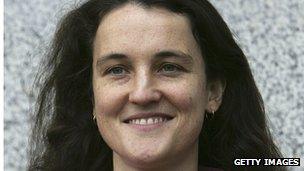A bridge too far for East Midlands rail electrification?
- Published
- comments

Transport Minister Theresa Villiers: Electrifying the Midland Main Line would be "complex, challenging and expensive"
MPs pressing for the electrification of the main rail link between London St Pancras and the East Midlands have received something of a reality check.
The cross-party campaign to upgrade the Midland Main Line has been building up its pressure on the government. Local newspapers have turned up the heat.
Their arguments are strong ones: shorter journey times into the capital would boost economic development, ditching the current diesel rolling stock would be an environmental plus and electrification would offer the type of "easy-hit" infrastructure project the government's looking to back.
Price tag? According to one Nottingham MP, it's £60m.
"If only it was that easy," appears to be the view of Transport Minister Theresa Villiers. A breaking point on her department approving the go-ahead later this summer could come down to bridges.
"The business case for Midland Main Line electrification does indeed look impressive," she told MPs.
"But the project would be complex and challenging, and it would be expensive to deliver. Major engineering work would be required.
"Just to make room for the overhead wires, more than 50 bridges would have to be rebuilt."
'Slowest speeds'
The minister also put a much higher estimate on the construction costs.
"Network Rail has estimated the capital cost of electrification alone to be just over £530m, not including the other improvements mentioned in the debate."
The line connects St Pancras and the Eurostar link with the highly marginal parliamentary seats of up to 25 MPs, most of them Conservative.
They don't come more marginal than Loughborough in Leicestershire. Its MP Nicky Morgan secured the late night Commons debate.
"We have the slowest speeds to and from London of any inter-city route. Nottingham and Sheffield are the last two of the eight 'core cities' with no electrified line in place or promised," she told the minister.
"The project will be good for businesses and our regional economies in so many different ways, and the Midlands has waited patiently for it for a very long time."
As midnight approached on the clock in the Commons' chamber, an indication of the parliamentary strength of feeling was the number of MPs who stayed up to take part in this short debate.
'Not fair'
Here's a flavour of some of the other contributions:
Sir Alan Meale, Labour MP for Mansfield: "£12.2 billion was spent on the networks, but only £200 million of it went in the East Midlands. That is not fair."
Andrew Bridgen, Conservative MP for North West Leicestershire: "My constituents should not be further handicapped by journey times that are longer than they need to be. I want these improvements to the Midland Main Line and so do my constituents."
Jon Ashworth, Labour MP for Leicester South: "The conurbations that the Midland Main Line serves are likely to grow by about 800,000 people over the next 20 years or so. There is clearly a demand for this service."
Nigel Mills, Conservative MP for Amber Valley: "People can get to London so much faster by driving to Tamworth and taking the West Coast Main Line, or over to Grantham or Newark to take the East Coast Main Line. If we could get East Midland Main Line trains up to the right speed, we could lose all those wasted car journeys too."
Will this parliamentary lobbying have any impact? We'll find out in July when the Department for Transport considers which long-term rail infrastructure projects to back.